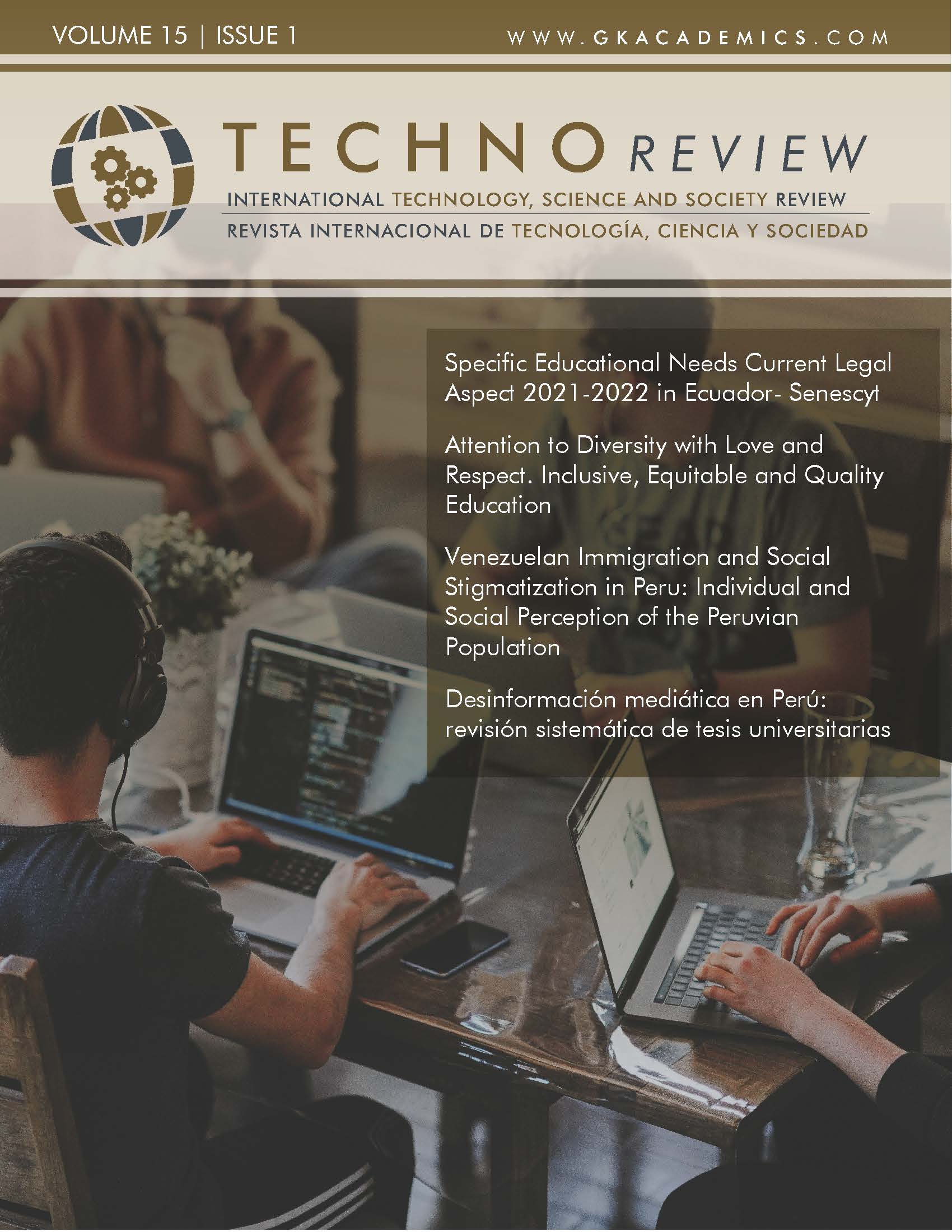The Professional Identity of University Teachers
DOI:
https://doi.org/10.37467/revtechno.v15.5102Palabras clave:
Professional Identity, Teacher, TrainingResumen
Society is experiencing a process of change, which impacts on the formation of citizens; the professional teaching identity is related to a behavior of improvement, which drags with it to the progress of its environment, it is necessary to understand the conceptualized, of the professional teaching identity to determine the theoretical conceptions on the professional teaching identity through a literature review. A literature review was conducted to determine the theoretical conceptions of the teaching professional identity, through the search of articles in different platforms, 23 articles were analyzed, between 2017 to 2022.
Citas
Alegre, M. (2021). Relevant aspects in data collection techniques and instruments in qualitative research. A conceptual reflection. Poblaciòn y Desarrollo, 28(54), 93-100. https://doi.org/https://doi.org/10.18004/pdfce/2076-054x/2022.028.54.093. https://doi.org/https://doi.org/10.18004/pdfce/2076-054x/2022.028.54.093.
Alvarez, G., & Sanchez, N. (2022). Systematic review: professional identity in teacher education during the. Polo del conocimiento, 2406-2433.
Aristizabal, A. (2017). Fortalecimiento de la identidad profesional docente a travês del trabajo en comunidades de desarrollo profesional que trabajan con la historia de la ciencia. Journal of research and didactic experiences, 3599-3604.
Aristizabal, A. (2019). Strengthening teacher professional identity in the field. https://doi.org/10.17227/ted.num46-10547, 189-204.
Bastidas, C. B. (2019). Information systems and technologies. [Sistemas y tecnologías de información] RISTI - Revista Iberica De Sistemas e Tecnologias De Informacao, 2019(E18), ix-x. Retrieved from www.scopus.com
Benavides, H. (2022). Degree of satisfaction and teacher identity in an educational unit{Master's Thesis, Universidad Cèsar Vallejo}. Institutional Repository.
Calderòn, C., Martha, R., Castañeda, G., & Rodriguez, F. (2021). Analysis of the working conditions of Ecuadorian teachers during the pandemic . Ciencia Latina, 5(1), 734-759. https://doi.org/https://doi.org/10.37811/cl_rcm.v5i1.273
Contreras, A., & Coromoto, D. (2018). Teacher education and the development of teacher professional identity. Digital Journal of the History of Education, 211 - 229.
Cuadra, D. Castro, P. Oyanadel, C. and González, I. (2021). Teacher professional identity in university education: a systematic review of qualitative studies. Formación Universitaria, 79-92.
Delgado, M., & Toscano, M. (2021). CONSTRUCTION OF THE PROFESSIONAL IDENTITY OF THE FUTURE SECONDARY SCHOOL TEACHER. Profesorado. Revista de Curriculum y Formaciòn del Profesorado, 25(1), 110-129. https://doi.org/10.30827. https://doi.org/10.30827
Fuentes, R., Arzola, D., Gonzalez, A. (2020). Teacher professional identity, an approach to its study. REDIECH Journal of Educational Research, 1-20.
Gonzalez, P., Marin, R., Soto, M. (2019). Professional identity in students and teachers from the university context: A review. Journal Ciencias de la Actividad Física, 1-14.
Mercado, M. (2019). Desarrollo profesional docente y su relación con la identidad institucional de una nstitución Educativa, Guayaquil - Ecuador 2019{Tesis de Maestrìa, Universidad Cèsar Vallejo}. Institutional Repository.
Molina, J. (2022). Identidad profesional docente en la neoliberalización{Tesis de Maestrìa, Universidad de Granada}. Institutional Repository. https://hdl.handle.net/10481/79639
Molina, P. (2021). Professional identity and initial teacher education: A possibility for teacher professionalization. Avances de investigación, 80-84.
Mora, N. (2020). The teaching practice of high school Language and Literature teachers in Cuenca-Ecuador, valued from their experiences. Memoria Académica, 345-362.
Núñez, M. (2021). Factors influencing the shaping of the professional identity of novice university teachers. Cuaderno de Pedagogía Universitaria, 27-41.
Olave, S. (2020). Review of concept of teacher professional identity. Innova Educación Journal, 378-393.
Otondo, B., & Nuñez, M. (2023). Adaptation and validation of an instrument to know the professional identity of teachers with focus on inclusive education. Revista Conhecimento Online , 33-61.
Otondo, M., Mayor, C. and Hernandez, E. (2021). Analysis of critical incidents of the professional teaching identity of beginning special education teachers . Formación universitaria, 25-38.
Pardo, M., & Opazo, M. (2019). Resisting schoolification from the classroom. Exploring the professional identity of early childhood teachers in Chile. Culture and Educatiòn, 31, 67-92. https://doi.org/https://doi.org/10.1080/11356405.2018.1559490. https://doi.org/https://doi.org/10.1080/11356405.2018.1559490
Pérez, E., Serrano, R., & Pontes, A. (2022). Teachers' Professional Identity Construction: A review of the literature. 1, 371-393. https://doi.org/https://doi.org/10.30827/profesorado.v26i1.13211
Quispe, M., & Josco, J. (2022). Identidad profesional del docente y la calidad educativa en una Institución Educativa de Chorrillos, 2022. Universidad Cèsar Vallejo, Lima.
Reyes, M. (2020). Dicente Professional Identity, a case study. Tecnològico de Monterrey, 7-12.
Torres, J. (2019). EFL Teacher Professionalism and Identity: Between Local/Global ELT Tensions. HOW, 26(1), 153-176. https://doi.org/https://doi.org/10.19183/how.26.1.501
Vanegas, C., & Fuentealba, A. (2019). Teacher professional identity, reflection and pedagogical practice: Key considerations for teacher education. Perspectiva Educasional, 115-138.
Vera, O. (2017). The new roles of the medical teacher. Cuadernos, 7-8.
Descargas
Publicado
Cómo citar
Número
Sección
Licencia
Aquellos autores/as que publiquen en esta revista, aceptan los términos siguientes:
- Los autores/as conservarán los derechos morales sobre la obra y cederán a la revista los derechos comerciales.
- Transcurrido un año desde su publicación, la versión del editor pasará a estar en acceso abierto en la web de la editorial, pero la revista mantendrá el copyright de la obra.
- En el caso de que los autores deseen asignar una licencia abierta Creative Commons (CC), podrán solicitarla escribiendo a publishing@eagora.org







